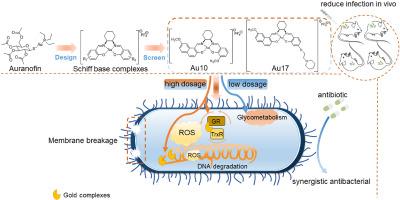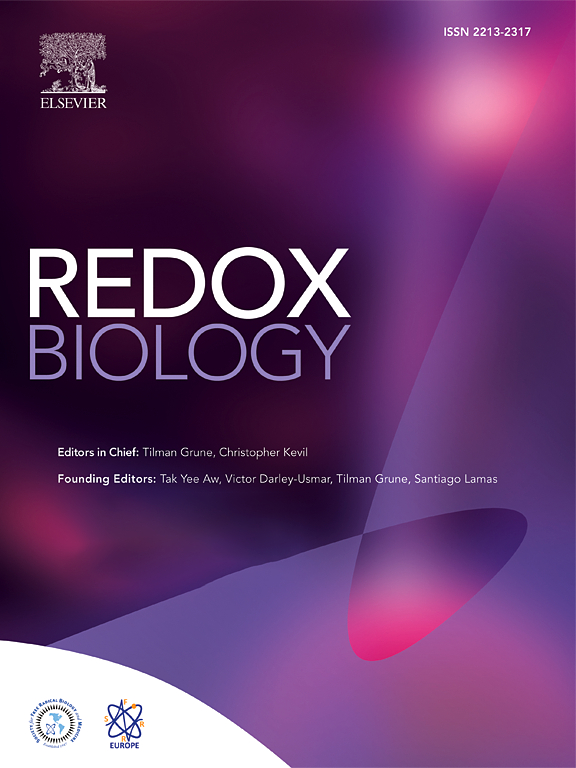Au(III) Schiff base complexes as oxidoreductase inhibitors against carbapenem- and colistin-resistant Gram-negative bacteria via targeting redox active motifs
IF 11.9
1区 生物学
Q1 BIOCHEMISTRY & MOLECULAR BIOLOGY
引用次数: 0
Abstract
Carbapenem- and colistin-resistant Gram-negative bacteria have become one of the most severe public health issues worldwide. The development of advanced antibacterial agents that can outpace microbial adaptation is imperative. The thioredoxin (Trx) and glutaredoxin (Grx) systems play important roles in maintaining redox homeostasis within Gram-negative bacterial cell membranes, with thioredoxin reductase (TrxR) and glutathione reductase (GR) being classical antibacterial targets. In this study, we found that Au(III) Schiff base complexes Au10 and Au17 exhibited potent activities against carbapenem- and colistin-resistant Gram-negative bacteria, as demonstrated in evaluations both in vitro and in vivo. Mechanistic studies revealed that Au10 and Au17 exert their antibacterial effects through multiple pathways: irreversibly inhibiting TrxR and GR activities via targeting redox-active motifs, impairing bacterial energy metabolism even at low concentrations, degrading deoxyribonucleic acid (DNA), causing reactive oxygen species (ROS) generation and intracellular redox imbalance. This study provides the first evidence that Au(III) Schiff base complexes possess strong activity against carbapenem- and colistin-resistant Gram-negative bacteria and can simultaneously inhibit the oxidoreductase in carbapenem- and colistin-resistant Gram-negative bacteria, establishing a new paradigm for antibacterial strategies and guiding future innovations in antibacterial therapy.

Au(III)希夫碱配合物通过靶向氧化还原活性基序作为抗碳青霉烯类和粘菌素耐药革兰氏阴性菌的氧化还原酶抑制剂
耐碳青霉烯和粘菌素革兰氏阴性菌已成为世界范围内最严重的公共卫生问题之一。开发能够超越微生物适应性的先进抗菌剂势在必行。硫氧还蛋白(Trx)和谷胱甘肽(Grx)系统在维持革兰氏阴性细菌细胞膜氧化还原稳态中起重要作用,其中硫氧还蛋白还原酶(TrxR)和谷胱甘肽还原酶(GR)是经典的抗菌靶点。在这项研究中,我们发现Au(III)希夫碱配合物Au10和Au17对碳青霉烯和粘菌素耐药的革兰氏阴性菌具有有效的活性,这在体外和体内都得到了验证。机制研究表明,Au10和Au17通过多种途径发挥抗菌作用:通过靶向氧化还原活性基序不可逆地抑制TrxR和GR活性,即使在低浓度下也会损害细菌的能量代谢,降解脱氧核糖核酸(DNA),引起活性氧(ROS)的产生和细胞内氧化还原失衡。本研究首次证明了Au(III)希夫碱配合物对耐碳青霉烯类和粘菌素类革兰氏阴性菌具有较强的抗氧化活性,并能同时抑制耐碳青霉烯类和耐粘菌素类革兰氏阴性菌的氧化还原酶,为抗菌策略建立了新的范式,指导未来抗菌治疗的创新。
本文章由计算机程序翻译,如有差异,请以英文原文为准。
求助全文
约1分钟内获得全文
求助全文
来源期刊

Redox Biology
BIOCHEMISTRY & MOLECULAR BIOLOGY-
CiteScore
19.90
自引率
3.50%
发文量
318
审稿时长
25 days
期刊介绍:
Redox Biology is the official journal of the Society for Redox Biology and Medicine and the Society for Free Radical Research-Europe. It is also affiliated with the International Society for Free Radical Research (SFRRI). This journal serves as a platform for publishing pioneering research, innovative methods, and comprehensive review articles in the field of redox biology, encompassing both health and disease.
Redox Biology welcomes various forms of contributions, including research articles (short or full communications), methods, mini-reviews, and commentaries. Through its diverse range of published content, Redox Biology aims to foster advancements and insights in the understanding of redox biology and its implications.
 求助内容:
求助内容: 应助结果提醒方式:
应助结果提醒方式:


